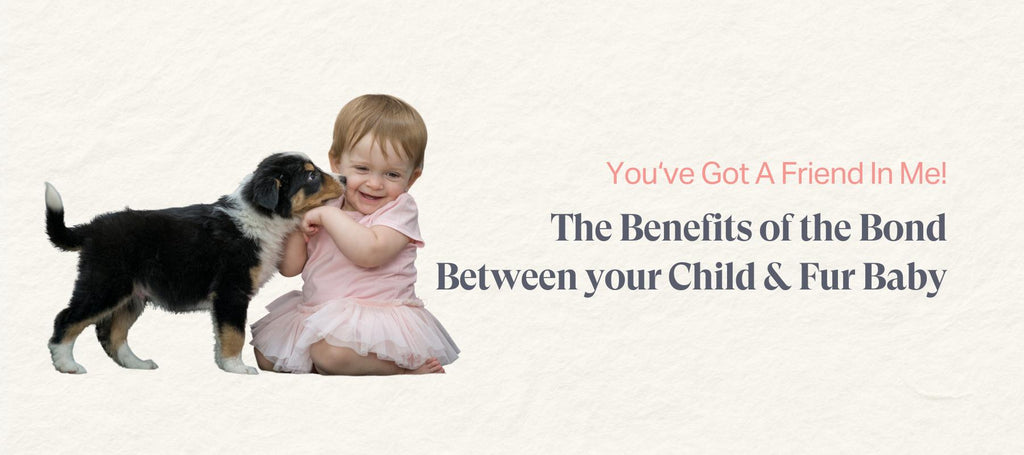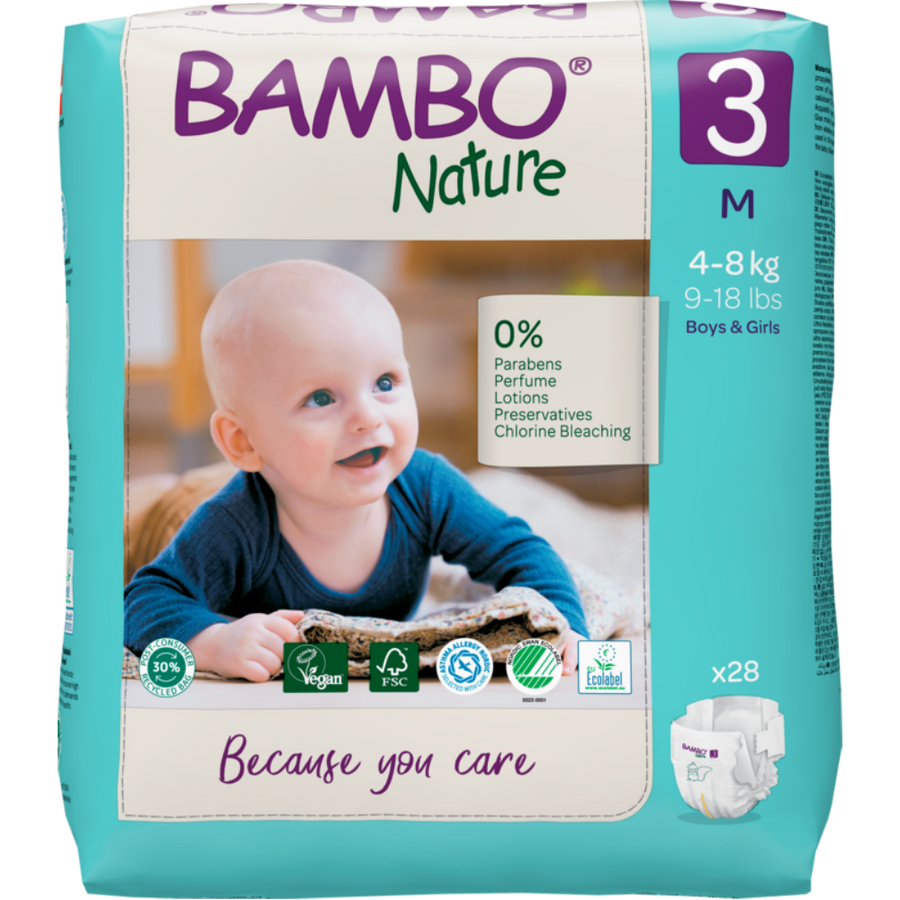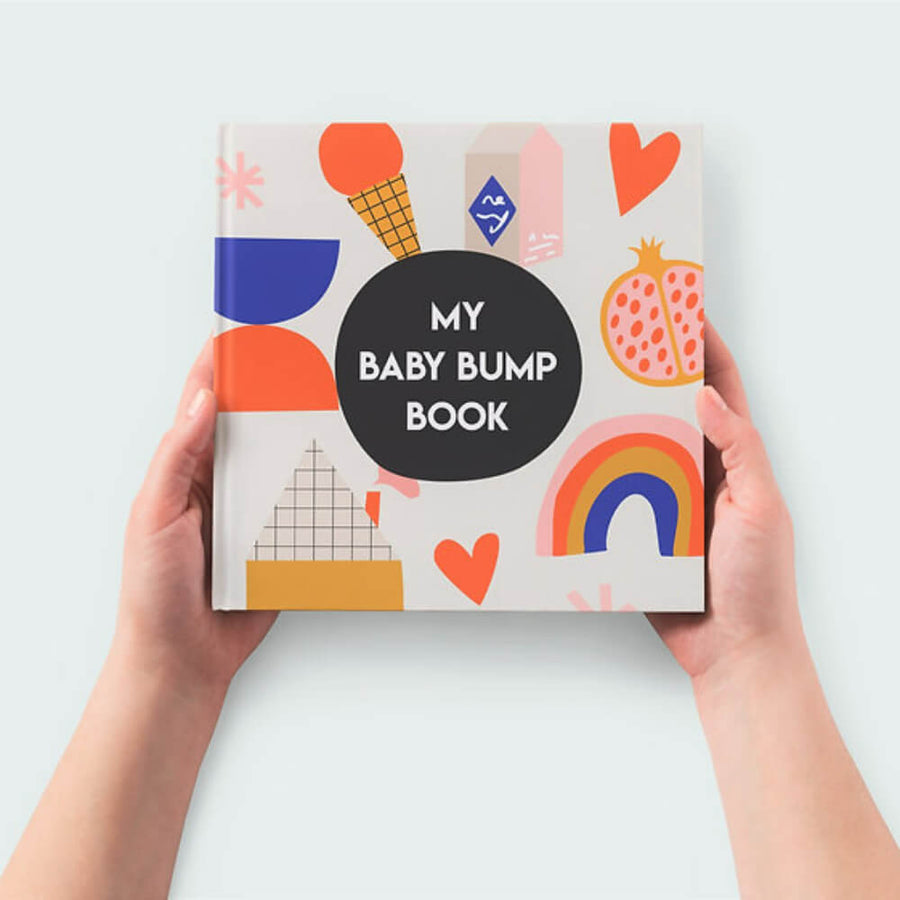You’ve Got A Friend In Me: The Benefits of the Bond Between your Child & Fur Baby

You’ve Got A Friend In Me: The Benefits of the Bond Between your Child & Fur Baby
Hello Super Parent!
Since you are here reading this, it is safe to assume you are pregnant or planning for pregnancy… and are a pet parent. If you do not yet, wait for the day your toddler will insist on having a pet. And we are here to tell you - get that pet!
There are many snippets of advice on how to prep your pet for the arrival of your baby, but this discussion is beyond the initial introduction; this is about growing up with a pet! It is proven that children growing up with pets are said to have higher self-esteem, social skills, and even cognitive development. Wondering how?
We’ll give you 5 reasons why your little one will have an unforgettable childhood with their
furry friend -
1. Pets and healthy children
Growing up with pets can have diverse benefits for children's health and development.
While there may not be a direct correlation between having a cat, and reducing the risk of say an ear infection in your toddler, studies suggest that exposure to animals from a young age can decrease the likelihood of developing certain allergies and illnesses
Research conducted by Dr. Dennis Ownby (M.D., a pediatrician and former head of the allergy and immunology department of the Medical College of Georgia, in Augusta) confirms this as well. Along with building immunity, interacting with pets can have positive effects on your little one’s mental health, contributing to better impulse control, and reduced symptoms of stress, depression, and anxiety. Taking care of pets will also instill a sense of responsibility in children, benefiting both the child and the pet. To top it off, the physical activity involved in caring for pets, such as walking dogs, will ensure overall physical well-being.
2. Pets and emotional regulation
Kristen Antonio, a licensed clinical counselor and school social worker from Massachusetts, highlights the two systems of regulation in humans: co-regulation and self-regulation. She explains that infants are biologically adapted to seek co-regulation from their caregivers i.e. parents and guardians, which is why they often calm down when held. As they grow, they learn to self-regulate or self-soothe. Antonio emphasizes that growing up with pets offers children a valuable chance to practice both these skills, as pets can provide comfort and be comforted by the child when they need it.
Dr. Gail F. Melson (Ph.D., professor emeritus of developmental studies at Purdue University in Indiana and the author of Why the Wild Things Are: Animals in the Lives of Children), who studies the impact of pets on human development brings forward an interesting observation - Nurturing isn't a quality that suddenly appears in adulthood; it needs practice from a young age. In our modern world, opportunities for children to care for others are limited. Dr. Melson believes pets offer a unique chance for children to develop caregiving skills early on. Her research shows that pet-owning kids spend significantly more time actively caring for their pets compared to those with younger siblings but no pets, indicating the importance of pets in fostering caregiving behaviors from a young age.
3. Pets teach social skills, and life skills and build self-esteem
Pets offer invaluable lessons in social skills, teaching children about boundaries, connection, respect, and empathy. According to Jackie Tassiello (a licensed board-certified art therapist who works with children), pets require care and connection, activating empathetic and compassionate behaviors in children. They also foster strong bonds through companionship, reciprocity, and give-and-take interactions. Additionally, pets help children learn to trust and form healthy attachments.
To boot, pets can influence behavior by teaching kids tolerance, acceptance, and the understanding that they cannot control others. Tassiello emphasizes that pets have distinct personalities, needs, and experiences, which encourages children to embrace imperfection, forgiveness, and multiple perspectives.
When it comes to communication skills, Mayra Mendez (licensed psychotherapist and program coordinator at the Providence Saint John’s Child and Family Development Center in Santa Monica, California), notes that interacting with pets, playing, and caregiving enhance language and problem-solving abilities in children. Teaching pets tricks and positive behavior provides opportunities for children to practice clear, accurate, and meaningful communication. Additionally, programs designed to improve children's reading skills often involve interaction with non-judgmental pets like dogs, which boosts self-esteem and communication confidence.
Pets also contribute to the development of life skills, as children learn responsibility, dependability, and empathy by caring for them. Antonio highlights that caring for a pet teaches children to prioritize the needs of others and empowers them to navigate interpersonal relationships with confidence. Training a pet also teaches children the importance of consistent, loving reinforcement and managing expectations effectively.
Studies have shown that pet ownership correlates with emotional health benefits for children, particularly in terms of self-esteem and loneliness reduction. Companionship with a pet friend can significantly contribute to children's emotional well-being and sense of self-worth.
4. Pets and family bonds
Have you heard of the scenario where Dad refuses to allow a pet in the house, but once the pet is in, they both are inseparable? That is true! One of the most unexpected, yet significant benefits of having pets is their ability to strengthen and unite families. Movies don’t fake that aspect, it is true!
Pets often become the focal point of family activities, from shared walks with the dog to grooming sessions and feeding routines, or simply spending quality time playing together. Whether it's watching a cat chase its tail or observing fish swim in their tank, the presence of pets adds joy and bonding opportunities to family life.
Engaging in the care of pets also offers a reprieve from the fast-paced nature of modern life.
In a world filled with over-scheduled activities, taking time to simply be with pets allows families to slow down and enjoy moments of relaxation and connection. Embracing these moments of "nothing" amidst the hustle and bustle can be a valuable way to nurture family bonds and create cherished memories together.
5. Learning about loss and grief
The loss of a beloved pet can be a profound experience for the entire family, offering valuable lessons in navigating grief and loss. According to Tassiello, pets teach us that the process of grieving is multifaceted, that adapting to change can be challenging, and that healing is a deeply personal journey for everyone involved.
Children, in particular, benefit from being involved in the grieving process, as it allows them to have a voice in how they wish to honor and remember their pets. By having caring adults inquire about their needs and preferences as they navigate their grief, children learn important coping skills and the significance of relying on their support network during difficult times.
Fascinating, isn’t it? The journey of raising a child alongside a furry companion is filled with numerous benefits and heartwarming moments that contribute to a memorable and enriching childhood - one that will be remembered forever. So, to all the super parents out there, embrace the safe and loving bond between your child and pet, for it is a journey filled with love, laughter, and countless tail-wagging. Have we convinced you to get the pet, yet?

















Leave a comment